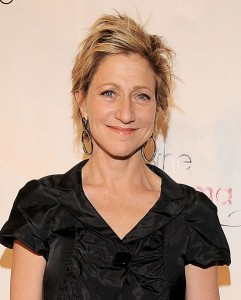edie falco on ageing
Edie Falco has enjoyed a long career in Hollywood, in an industry that places great emphasis on beauty and youthful appearance. In a recent interview about ageing whether or not it had affected her career, Falco commented on Hollywood’s ageism, and her own experiences in the industry.
‘It continues to get better and more rewarding and fuller and more confident and all these things that I kind of never realised how much I had longed for until I had them,’ Falco said. ‘I feel like it’s an ideal time to, I don’t know, to be me.’
‘What I’m sure is that if I don’t work forever I’ll be fine either way,’ she said. ‘I’ve kind of my whole life hoped to one day feel the way I do right now, which is that everything is going to be fine.’
Falco first shot to stardom at age 35, playing mob wife Carmela Soprano on HBO’s The Sopranos. Her role as the titular character on Showtime’s Nurse Jackie (currently airing in Australia on Showcase) cemented her position.
Falco is one of a few women over the age of 40 in a leading role on a TV show. She is also one of a few actresses in the history of Hollywood take home all of the major television awards for drama and comedy.
It is safe to say Falco’s success as a mature actress makes her the exception to the rule. As a lot of female actors in her age bracket, such as Susan Sarandon, Michelle Pfeiffer and Julianne Moore have stated that ageing is still the biggest reason why women over 40 have trouble finding work in Hollywood today, as Hollywood continues to promote a distorted picture of gender and age.
In Hollywood, television and film over represent female characters in their 20s and 30s and male characters in their 30s and 40s, and underrepresent women and men aged 50 and older. Unrealistically, Hollywood tends to casts significantly younger women to play much older women. Thus, there are fewer and fewer opportunities for women over 40.
Chances are if a woman does not become a star of a hit TV show or a film by the time she reaches 40, she won’t succeed. Part of the problem is that few leading roles are written for women over 40, especially in film. Typically, in movies, actresses in their 40s and over are cast in supporting roles, rather than leading roles – always someone’s mother or wife. There is an undeniable double standard in the portrayal of ageing characters, both male and female. Women are frequently considered “too old” to play opposite male actors of the same age. The leading woman opposite the man is generally cast ten to twenty years younger.
Male characters in their 40s and 50s are more likely than female characters of the same age to play leadership roles, wield occupational power, and have aspirations. Female characters are subsequently less flexible and diverse than their male counterparts. When a women over 40 wields such power, they’re shown as overstepping their boundaries, overly aggressive, or somehow uncomfortable with that power. Even Edie Falco’s character on Nurse Jackie fits this description, as Jackie relies on a wide array of prescription drugs to perform her job as a wife and a mother.
Unfortunately, judging by the state of entertainment today, post-40 success like Falco’s is a rare thing – and Hollywood’s ageism doesn’t look likely to change any time soon. Falco should be counting herself lucky.



Pingback: Feminist News Round Up: 15.06.14 | lip magazine